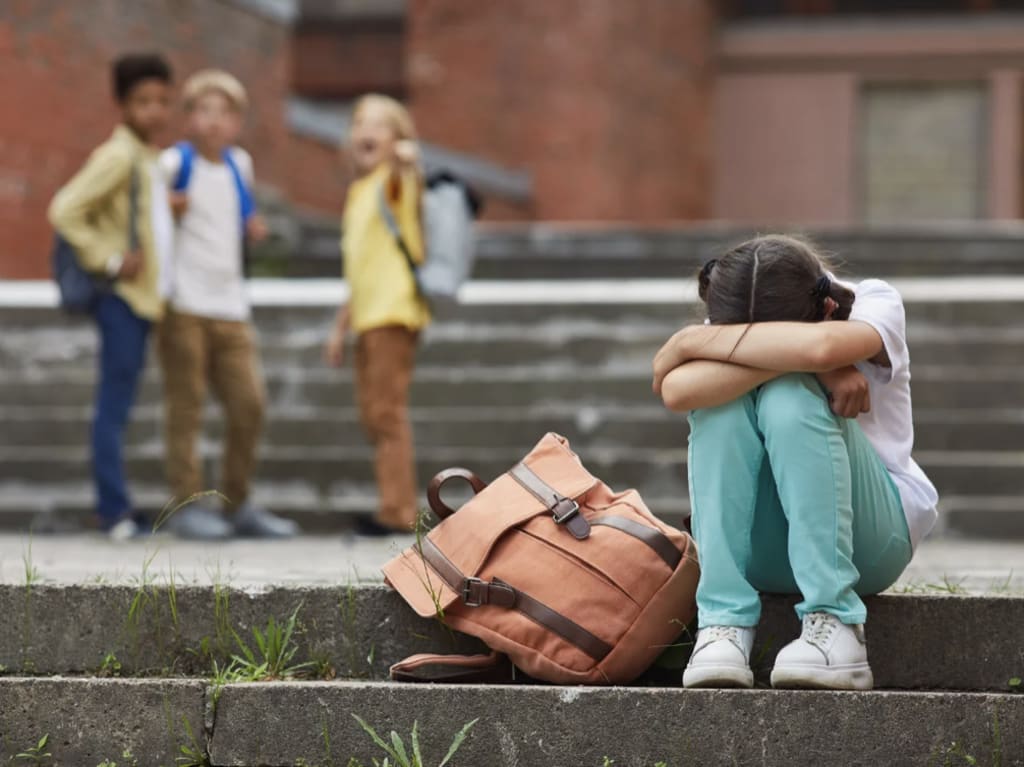
I’m not sure who needs to hear this, but there’s a dangerous misconception that bullying equals affection. I’m not talking about playful teasing with your friends, I’m talking about actual harassment and bullying behavior. Especially if you grew up in the public school system, I’m sure you or someone you know has experienced some level of bullying or teasing when you were younger.
Bullying has long been a pervasive issue in schools, workplaces, and even online platforms. The persistent and harmful misconception of the idea that when someone bullies another person, it’s actually a sign of hidden affection, needs to be squashed once and for all. This notion not only perpetuates a dangerous cycle of harmful behavior but also undermines the severity of bullying and its long-lasting impact on the victims.
I remember in elementary school getting picked on a lot by a group of 4 boys. They were besties and I was quiet, (not shy – there’s a difference!) and I wasn’t cool or confident by any means, making me an easy target for bullying. I specifically remember a day when the teacher moved our desks into groups of 5, and just as the universe would have it, my desk was added to this group of boy bullies. They looked absolutely repulsed that I had to join their little desk crew. Well, I wasn’t too happy about it either. On this day I also remember wearing my Thai gold necklace that my grandmother had given me as a gift and I wore it with pride – it had a letter “A” on it for my name, Alicia. One of the bully boys looked at me and said, “What does the ‘A’ stand for? Asshole?” (First of all, let’s pause here for a second. Can you imagine a boy who was considered popular, athletic, and cute, basically a pretentious mini jock “bro” saying this to a tiny, quiet, half-Asian girl simply minding her own business?! Confirmed - some kids really suck.)
It crushed me. I remember being so embarrassed and caught off guard, not knowing what to say or how to speak up for myself… I sat on the hill overlooking the playground during recess, away from all of the other kids, and cried. One of the teachers had come over to me and when I told them what happened, I was met with the response, “Oh, he was just playing around! And you know what that means? It means he likes you!” I didn’t accept that for a minute. This gross response from this adult made me realize that it was no longer a good idea to tell my teachers or other adults in my life what was happening. It wasn’t long after that that I was going to the nurse a lot, asking her to call my mom to pick me up because I was “sick.”
When I told my fiancé this story one time, he said “Aw babe, I’m so sorry. Those boys sound like the worst!” He’s right, they were the worst at that time! But I laugh because there’s no need to be sorry, especially because at that time, I knew in my heart that this mean behavior did not equate to hidden affection.
Let’s talk a bit about the nature of bullying. Bullying is a deliberate and repetitive act meant to cause harm or distress to another individual. It can take various forms, including verbal abuse, physical intimidation, exclusion, and cyberbullying. (Before the Internet, bullying ended when you withdrew from whatever environment you were in. But now unfortunately, the bullying dynamic is harder to contain and harder to ignore, but could still be confused as affection or flirting when it may actually be bullying and gaslighting in its true form.)
The idea that bullying is an expression of hidden affection is misguided and contributes to a culture that trivializes the harmful consequences of such behavior.
Another aspect of this is the psychological impact. Victims of bullying often experience significant psychological distress, ranging from anxiety and depression to long-term emotional scars. Believing that bullying is a misguided form of affection may lead individuals to dismiss the real and damaging consequences of such actions. This misconception can exacerbate the emotional turmoil experienced by victims, making it challenging for them to seek help or speak out against their tormentors.
Perpetuating harmful dynamics can sometimes happen in such a subtle way, that the person doing it doesn’t even realize it. I’m sure the teacher who told me this boy who bullied me actually liked me was not intentionally trying to perpetuate an environment of distress, but I think she actually believed kids will be kids, and boys will be boys, and this is just how they show interest in girls.
Promoting the idea that bullying is a misguided expression of affection perpetuates harmful dynamics in relationships. This misconception can lead individuals to tolerate or even romanticize abusive behavior, fostering a culture where harmful actions are excused under the guise of hidden feelings. This can create a toxic environment where victims are gaslighted into believing that they should endure mistreatment as a sign of someone's affection.
In healthy relationships, communication, trust, and respect are the cornerstones. Bullying, on the other hand, goes against these principles, creating an environment of fear, intimidation, and distress.
It is crucial to distinguish between healthy expressions of affection and toxic dynamics that may lead to lasting harm.
To break the cycle of the misconception that bullying equates to affection, it is essential to educate not only our youth in educational settings, but anyone in a relationship in general about the importance of empathy, kindness, and respect. Emphasizing healthy communication and conflict resolution skills can help build positive relationships while discouraging harmful behavior.
Promoting open dialogue about bullying and its impact is crucial for creating awareness and fostering a supportive environment. By encouraging individuals to speak out against bullying and share their experiences, we can debunk the harmful myth that mistreatment is a form of affection and instead promote healthier relationship dynamics.
Bullying is a serious issue that demands attention, and perpetuating the misconception that it is a sign of affection only serves to undermine efforts to address this pervasive problem. It is crucial to recognize the damaging impact of bullying and work towards fostering environments built on empathy, respect, and kindness. By debunking the dangerous myth that bullying is a misguided expression of affection, we can contribute to a culture that prioritizes the well-being of individuals and promotes healthy, positive relationships.
Let’s all practice being kinder to one another, and teach our children to be kind to others as well. Learning kindness and respect starts in the home, and if we learn to detect toxic behavior early on and foster a safe environment with open dialogue, we can call this behavior out for what it is, and spread the word that bullying DOES NOT equal affection. ~
About the Creator
Li-Li 📓
Just a modest woman living in a modern world, writing about what I know while embracing life’s simple pleasures, & finding solace in the rhythm of words and the unconditional love of my dog. ♥






Comments
There are no comments for this story
Be the first to respond and start the conversation.